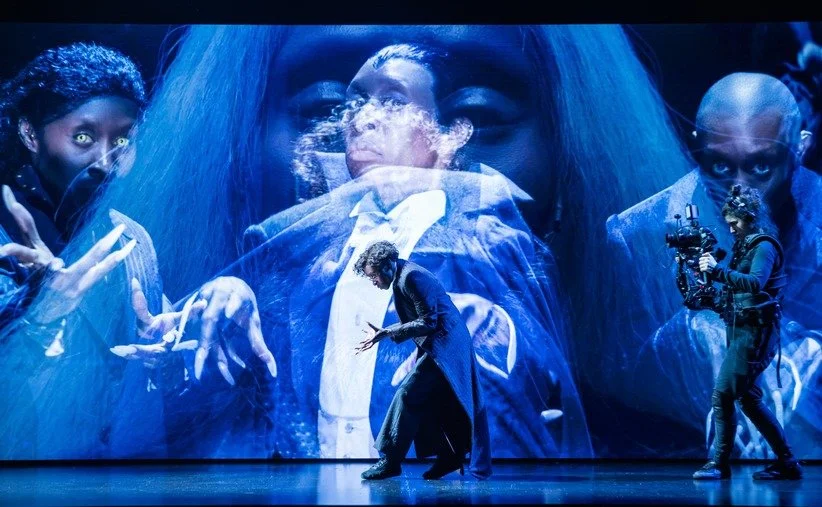The Values of Names, White Bear Theatre Review
Benny (Jeremy Kareken) in The Value of Names. Photo by Zack Layton
Written by Danai for Theatre and Tonic
Disclaimer: Gifted tickets in exchange for an honest review
The Value of Names at the White Bear Theatre, written and directed by Jeffrey Sweet, is a thoughtful and intellectual play that is treated with respect by the creatives behind it. This respect is evident in the production, which relies heavily on dialogue rather than spectacle. The play engages with the audience through deep themes and a debate that unfolds throughout, rather than relying on action or flashy stage changes. Bringing such a dialogue-heavy work to today’s vibrant London theatre scene is a challenge, particularly as it may seem less immediately relevant to contemporary concerns. Yet, the issues raised in the play—identity, memory, and betrayal—are universal and timeless.
The plot centers on Benny (Jaeremy Kareken), an actor who now sees his daughter, Norma (Katherine Lyle) following his footsteps as she has become an actress herself. From the outset, Norma makes it clear that communication with her father isn't always easy. She addresses the audience directly, setting the tone for the play with her commentary on the situation. A key conflict arises when Norma discusses her new role, which requires her to undress on stage—something Benny finds troubling. Even more contentious is her desire to change her last name to avoid being seen as just Benny's daughter in the industry. The tension escalates when the name of Leo (Tim Hardy), Benny’s old friend and fellow artist, is mentioned. Thirty years earlier, Leo betrayed Benny to the House Un-American Activities Committee, destroying both Benny’s career and their friendship. The past comes back into play when Norma’s director drops out and is replaced by none other than Leo. Though Benny does not outright tell his daughter not to work with Leo, it’s clear he is not happy about it. As the story unfolds, Leo confronts both Benny and Norma, leading to a long-overdue confrontation between the two men.
Three strong performances drive the show, and the chemistry between Benny and Leo is beautiful. However, at times, the production feels a little monotonous and could benefit from more variation in the expression means seen throughout. Some of the staging choices, such as Benny’s fake painting, could be expanded to add depth to the performance. A more immersive approach—perhaps Benny physically engaging with real paint—might have added some texture to the scene. The lighting, too, could be used more creatively to highlight moments of tension and enhance the emotional stakes. Though Tim Hardy’s entrance as Leo undeniably shifts the energy of the play, there is little change in tone until near the end, when Benny raises his voice to Norma. A more gradual escalation, perhaps through lighting or sound cues, could help build more dramatic momentum throughout the piece.
At its heart, The Value of Names explores whether personal actions, particularly political ones, should forever define an artist’s work. The play raises crucial questions about memory, compromise, and artistic integrity. However, it is hard to escape the feeling that the production leaves too much unsaid, allowing the audience to linger in ambiguity without providing a clear resolution. This lack of a definitive stance is not necessarily a flaw, but in a time of political turmoil, the absence of a clear conclusion may leave some viewers wanting more.
Additionally, the portrayal of Benny as a dramatic, stubborn man in contrast to Leo’s calm, composed demeanour risks tipping the balance of the argument. While this may be intentional, it may also give the impression of bias, with Benny’s emotional outbursts and old-fashioned values pitted against Leo’s rational, compassionate perspective. Some directorial choices might help to present the two arguments more evenly, allowing both characters to be seen in a more balanced light.
Overall, The Value of Names is an engaging exploration of themes that remain highly relevant today. The play’s focus on memory and historical accountability offers a powerful reflection on how we engage with the past and the decisions we make in our personal and professional lives. It serves as a timely introduction to McCarthyism for younger audiences and provides an opportunity to reflect on the lingering consequences of that era. While the pacing could be tightened and the monotony of the staging addressed, the production is ultimately a sincere and thought-provoking piece. With a clearer way to highlight its relevance and timelessness, The Value of Names could fully realise its potential and reveal its true value.
At White Bear Theatre until 1 March 2025
★ ★.5













